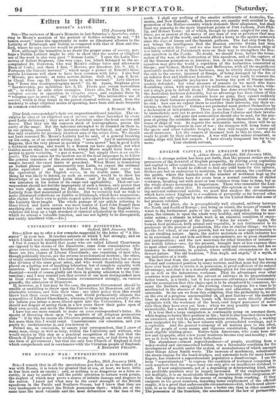'UNIVERSITY REFORM: THE DISSENTERS.
Oxford, 24th January 1854. Sin—Allow me to offer a few remarks suggested by the letter of "A Dis- senter" in your last. It touches subjects on which .1 feel strongly, and on which I think much misapprehension exists on both sides.
I fear it cannot be denied that many who are called Liberal Churchmen are opposed to the claims of the Dissenters; some from conscientious reli- gious convictions, some from hereditary prejudice or secret jealousy. But there are two classes of Liberal Churchmen ; one consisting of men who, though politically liberal, are the reverse in ecclesiastical matters ; the other, of really consistent Liberals, who look upon Dissenters not as foes but as ano- ther division of the same great army, and who would thankfully see them placed on a footing not of insulting toleration but of complete equality with ourselves. These men—and I believe that they. are neither few nor unin- fluential—would of course gladly aid them in gaining admission to the Uni- versities; and I may remind you that several of our most distinguished men in their evidence to the Commission recommended strongly, on various grounds, the admission of Dissenters.
If, however, as I fear may be the case, the present Government should be unable or unwilling to throw open the Universities, let Dissenters aid in all attainable reforms, and bide their time : any other policy than this would throw back their cause twenty years, and would permanently alienate the sympathies of Liberal Churchmen ; whereas, if by carrying out a really effect- ive reform you infuse a more liberal spirit into the Universities, I for one should not despair of seeing them in a few years throw their gates open of their own accord, and invite the Dissenters to come in.
I have but one more remark to make on your correspondent's letter. He speaks of throwing them open "to members of all religious persuasions alike" : if by this he means all Christian persuasionsg am at one with him, but more than this I would resist. Unsectarianize our education, and you purify it ; unchristianize it, and you destroy it. Permit me, in conclusion, to assure your correspondent, that I snow of many men, clergy as well as laity, within the University and without, who would rejoice in this step as a practical recognition of the fact that the Church of England is not to be confined to any one sect, or tied down by any one form of government ; but that the only true Church of England is that which comprehends and is coextensive with the Christian people of England. A RESIDENT FELLOW.






























 Previous page
Previous page